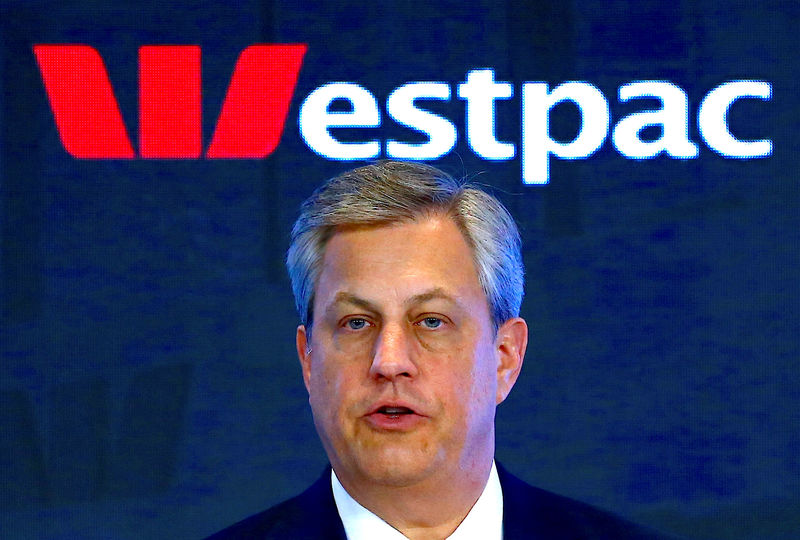By Byron Kaye
SYDNEY (Reuters) - The chief executive of Australia's Westpac Banking Corp stepped down on Tuesday over a money laundering scandal involving child exploitation, just a day after he told staff it was "not a major issue" and that he intended to stay on.
The swift turnaround by U.S. born Brian Hartzer underscored how politically and publicly sensitive missteps by Australia's big banks have become in the wake of a bruising public inquiry that found rampant profiteering in the industry.
Hartzer's departure from Australia's second largest lender, effective from Dec. 2, made Westpac the third of the country's top four banks to lose its top executive in the past 18 months.
Regulator AUSTRAC last week launched legal action accusing Westpac of enabling 23 million payments in breach of anti-money laundering laws, including the facilitation of offshore payments relating to child exploitation.
Prime Minister Scott Morrison was among those calling for the bank's board to consider the future of its executives, but chairman Lindsay Maxsted had said over the weekend that a change at the top would be destabilizing for the bank.
That all changed on Tuesday, when Maxsted announced both Hartzer's exit and that his own retirement in the first half of next year. He had said in September he had no intention to retire.
"We sought feedback from all our stakeholders ... it became clear that board and management changes were in the best interest of the bank," Maxsted said in a statement.
Maxsted added in a media call that his successor would run a global search for a new CEO and Chief Financial Officer Peter King would take over in the interim. King said he would stay "as long as the board needs me".
Hartzer had told senior staff in a meeting on Monday that the crisis was "not an Enron or Lehman Brothers", according to The Australian newspaper, referring to the two famous corporate collapses.
The newspaper quoted Hartzer, who started as CEO in 2015, as telling staff that "for people in mainstream Australia going about their daily lives, this is not a major issue so we don't need to overcook this". A source with knowledge of the meeting confirmed the quotes to Reuters.
Maxsted said Hartzer's reported comments were "very disappointing ... and I and the board do not agree," although he added they needed to be read in context.
Hartzer will depart the two-centuries-old company, which had seemed one of the least damaged by the Royal Commission inquiry, with a year's base salary of A$2.69 million but no bonuses.
"These alleged breaches are of the most serious nature, and there needed to be accountability," Treasurer Josh Frydenberg told reporters in Canberra.
CLEAN-UP JOB
The changes leave King with the task of running an investigation into how the bank facilitated offshore payments that violated anti-money laundering protocols for more than half a decade, as alleged by AUSTRAC.
The scandal is likely to be front and center at Westpac's annual general meeting, scheduled for Dec. 12., although Hartzer's exit might dampen some of the fireworks.
Westpac's shares rose 1.8% by Tuesday afternoon, having slumped 8% over the previous four trading days since the regulator announced its lawsuit, wiping A$7.5 billion off the bank's market capitalization.
"They'd been talking to institutional shareholders this week so it was the only feasible outcome to defuse the situation," Bell Potter banking analyst TS Lim said. "They have been seen to be doing something."
The Australian Council of Superannuation Investors (ACSI), whose pension fund members are investors in Westpac, said it believed the crisis "warrants further board renewal in the new year."
Maxsted said any breaches were not made "through deliberate neglect" as he accepted that some customers may leave the bank.
He noted that AUSTRAC was in regular contact with Westpac, including a meeting with the bank's board in March, yet did not raise concerns about the offshore payments until September.
"We don't have all the details," he said, adding it appeared that Westpac had been offered an update to protections for its offshore payments system, LitePay, which it did not adopt.
Larger rival Commonwealth Bank of Australia (AX:CBA) was accused of similar - but far fewer - breaches by AUSTRAC, resulting in a record A$700 million penalty and the early retirement of its CEO.
Both the CEO and chair of No. 3 lender National Australia Bank (AX:NAB) stood down after being singled out in the Royal Commission for failing to accept responsibility for company wrongdoings.

Financial planner AMP Ltd (AX:AMP) lost its CEO, chair and several board members over accusations of doctoring a supposedly independent report to a regulator.